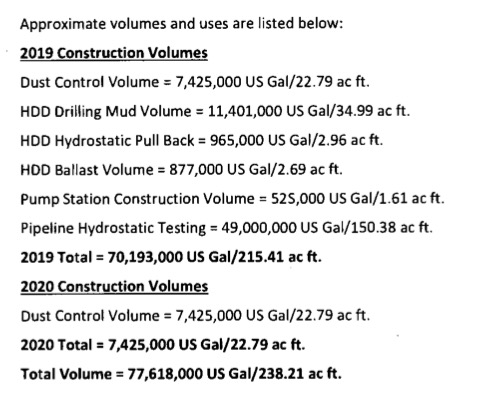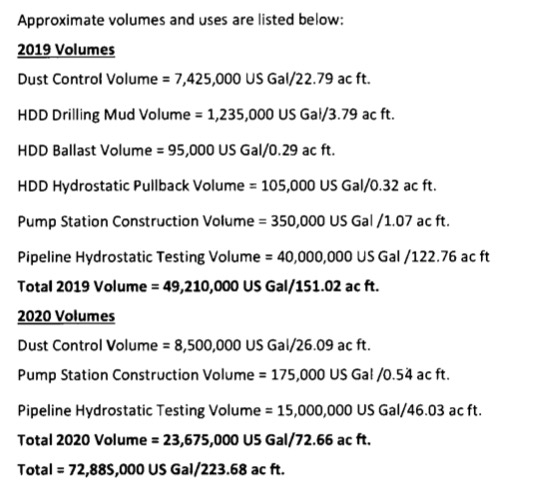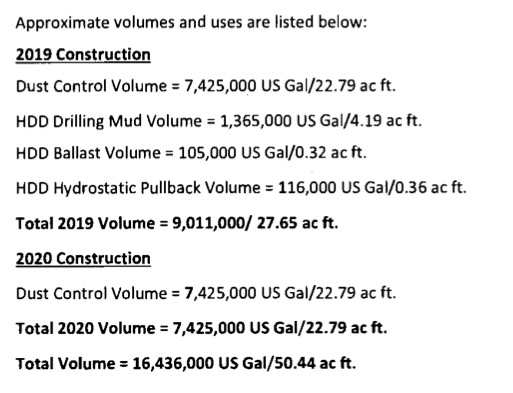Bob Mercer reminds us that the state Water Management Board meets Wednesday to consider TransCanada’s application to slurp up water for its delayed Keystone XL pipeline build. The board convenes at 11 a.m. for other business; it turns to TransCanada’s Water Permit Applications 1986-1, 2792-2, and 2793-2, along with landowner Water Permit Applications 1963A-1 and 1975A-1, at 1 p.m. The board agenda says the meeting will continue through the afternoon and evening and into the morning or July 18 if necessary.
Application 1986-1 requests 77.6 million gallons of water from the Cheyenne River in Meade County over two years of construction:

Application 2792-2 requests 72.9 million gallons of water from the White River in Lyman County over two years.

Application 2793-2 requests 16.4 million gallons of water from the Bad River in Haakon County over two years.

That’s 166.9 million gallons of water for construction. Dean Wink‘s and Tom and Lori Wilson‘s applications only add backup water supply for TransCanada’s man camps as an authorized use on existing permits; they do not request additional water.
To put 166.9 million gallons in perspective, in a separate matter in Wednesday’s WMB agenda packet, the City of DeSmet says its annual water usage over the last four years has ranged between 45.3 and 53.3 million gallons. In each of the last three years, the City of Castlewood reports annual water usage of 19.2 million gallons. The TM Rural Water District, based in Parker, reports its annual average water demand has more than tripled from 237 million gallons in 1998 to 762 million gallons in 2017, thanks largely to the NuGen Ethanol Plant, crop spraying, and CAFOs.
Keep in mind that the water used in DeSmet, Castlewood, and Turner County supports South Dakota residents and businesses. The water TransCanada requests will be used to build a pipeline which will ship a Canadian product to the global market and raise South Dakota’s gas prices.
Ultimately the issue with the volume is where is the water coming from, and is there enough recharging of the source from nature (per year).
The other issue is what happens at the end of use. I guess nature will do something with the water (but when and where is a question), but I would think there would be some kind of on-site recycling/restoration/treatment.
Your link to the increase in gas prices comes from 2013. At the moment Canada has been having an issue with storage capacity, so that glut has decreased their prices. Has this decrease been larger than your projected increase….so that overall one could have a net decrease?
Water management board generally decides issues technically on whether adequate water is available. That is usually determined by staff after some study of local well or surface water sources. Generally, staff recommendations are important here, but if someone with a nearby water source or competing water right feels their might not be adequate water available to address all interests they can contest. Game, Fish and Parks can also be involved if water in streams might be depleted enough to affect wildlife.
The board has the power to address broader issues than just water availability. They can go deeper into environmental impacts or economic impacts under their consideration of public interest. Generally, they just make superficial finding of public interest, but intervenors can address economic issues, pollution issues, etc., during the hearings. It is usually difficult to get the board to turn down a permit on those issues, though.
Do they want the water so they can do this with it?
“Cleanup is underway after 21,000 gallons of brine oilfield wastewater leaked from an underground pipeline in western North Dakota and into an unnamed tributary of the Missouri River, the state Health Department said Monday.
“State environmental scientist Bill Suess said the pipeline operator, Polar Midstream LLC, on Sunday reported the spill of produced water, a byproduct of oil production that contains saltwater and oil, and sometimes chemicals from hydraulic fracturing operations.
“The spill occurred about 20 miles (32 kilometers) east of Williston and about a mile from Lake Sakakawea, the largest reservoir on the Missouri River.”
is.gd/OElSuB
These are motions and scheduling hearings, not the actual permit hearings.
Nevertheless, Hearing Officer Rodney Freeman has issued orders denying a number of TransCanada’s motions to preclude a number of items for consideration (including the merits of the pipeline, treaty rights, etc.) as well as denying their motion to exclude the Nebraska intervenors.
The WMB has the final say on those decisions, so showing up in support of a full hearing on all the issues (whenever it is scheduled) is highly encouraged.